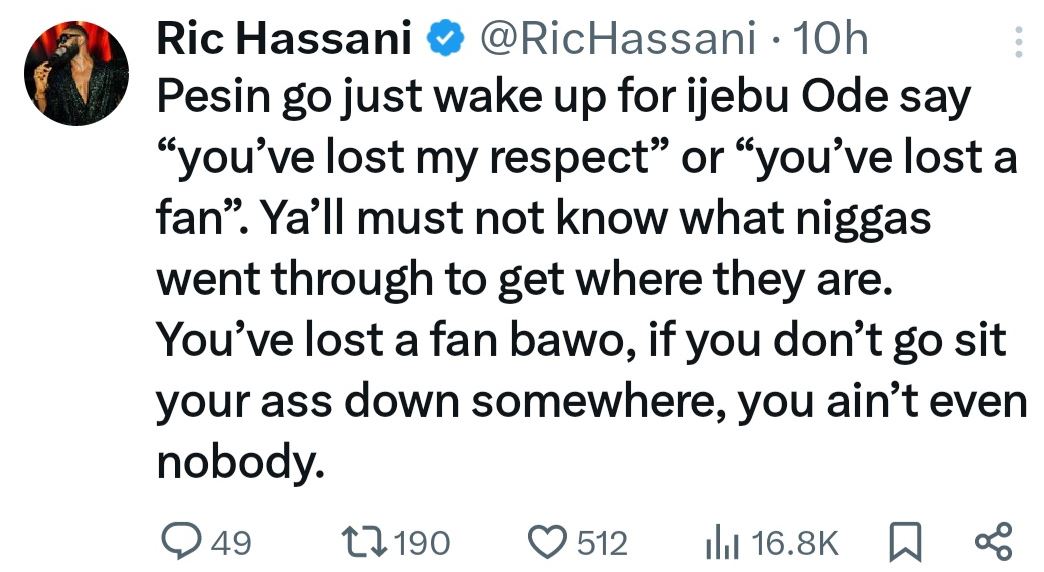Nigerian singer-songwriter Ric Hassani has ignited a fiery debate on social media with his recent criticism of fans who threaten to withdraw their support from celebrities. The “Thunder Fire You” hitmaker took to X (formerly Twitter) on October 2, 2024, to express his frustration with what he perceives as unwarranted and trivial fan criticism.
Hassani’s post, which quickly went viral, took aim at individuals who casually declare their loss of respect or fandom for celebrities. The singer wrote:
Someone just wakes up in Ijebu Ode and says, ‘you’ve lost my respect’ or ‘you’ve lost a fan’… Y’all must not know what [we] went through to get where [we] are. You’ve lost a fan bawo? If you don’t go sit your ass down somewhere. You ain’t even nobody.”
The tweet, laced with a mix of English and Nigerian Pidgin, resonated with many in the entertainment industry while simultaneously ruffling the feathers of some fans.
Hassani’s outburst sheds light on a often-overlooked aspect of celebrity life – the struggles and sacrifices made on the path to stardom. Music industry analyst Oluwaseun Adebayo offers insight into this perspective:
“What Ric Hassani is touching on here is the disconnect between public perception and the reality of an artist’s journey. The road to success in the Nigerian music industry is fraught with challenges that fans often don’t see or appreciate.
This sentiment is echoed by fellow Nigerian artist Yemi Alade, who commented on Hassani’s post: “Louder for those in the back! The sleepless nights, the financial struggles, the rejections – it’s not an easy path.
The response to Hassani’s tweet has been polarizing. While many industry insiders and fellow celebrities have rallied behind the singer, some fans feel that his words were unnecessarily harsh.
Twitter user @MusicLoverNG wrote: “Artists need to remember that fans are the reason for their success. Without us, who would listen to their music?”
On the other hand, @NaijaEntertainment tweeted in support: “Ric is just saying what many artists think but are afraid to say. It’s about time someone addressed the entitlement of some fans.”
Hassani’s post has sparked a broader conversation about the relationship between celebrities and their fan bases in the age of social media. Dr. Funmilayo Adeoye, a cultural critic and professor of media studies at the University of Lagos, weighs in:
What we’re seeing here is a shift in the power dynamic between artists and fans. Social media has given fans unprecedented access to celebrities, but it’s also created a sense of entitlement that some artists are now pushing back against.
As the debate rages on, industry experts are considering the potential long-term effects of such public exchanges between artists and fans. Music promoter Adebola Williams notes:
This could be a turning point in how Nigerian artists interact with their fan bases. We might see more celebrities being openly critical of fan behavior, which could reshape the fan-artist relationship in the industry.
As social media continues to evolve, so too will the dynamics between celebrities and their followers. Ric Hassani’s outspoken post may be a harbinger of a new era of more direct, unfiltered communication from artists to fans.
Entertainment lawyer Folake Akinpelu predicts: “We may see more artists setting boundaries and challenging the notion that fans are always right. It’s a delicate balance, but one that needs to be struck for the mental health and creative freedom of our artists.
Ric Hassani’s bold statement has undoubtedly opened a Pandora’s box of discussions about respect, appreciation, and the complex relationship between artists and their audiences. As the Nigerian entertainment industry continues to gain global recognition, these conversations will play a crucial role in shaping its future.
Whether Hassani’s words will lead to a lasting change in fan behavior or simply fade away as another social media moment remains to be seen. What’s clear is that the dialogue between artists and fans in Nigeria is evolving, and both sides are reassessing their roles in this dynamic relationship.




